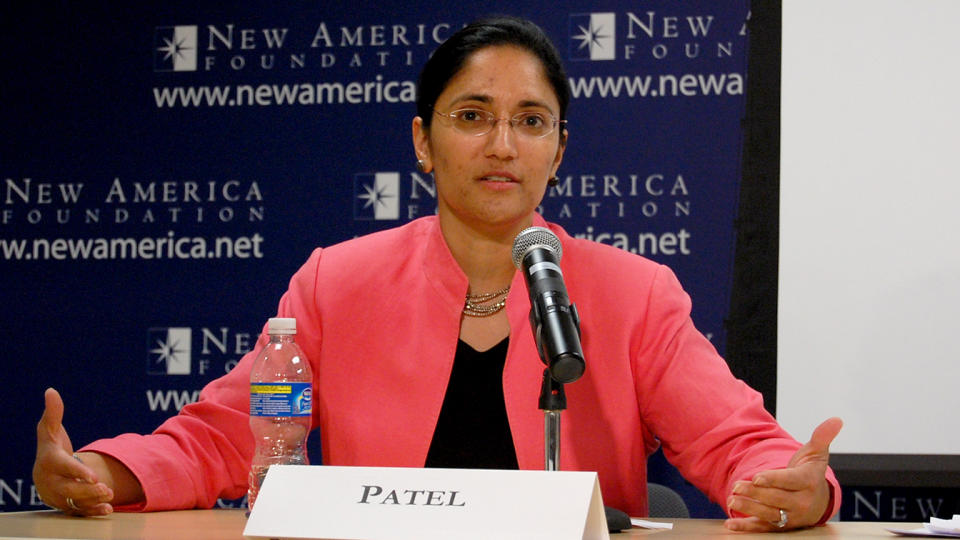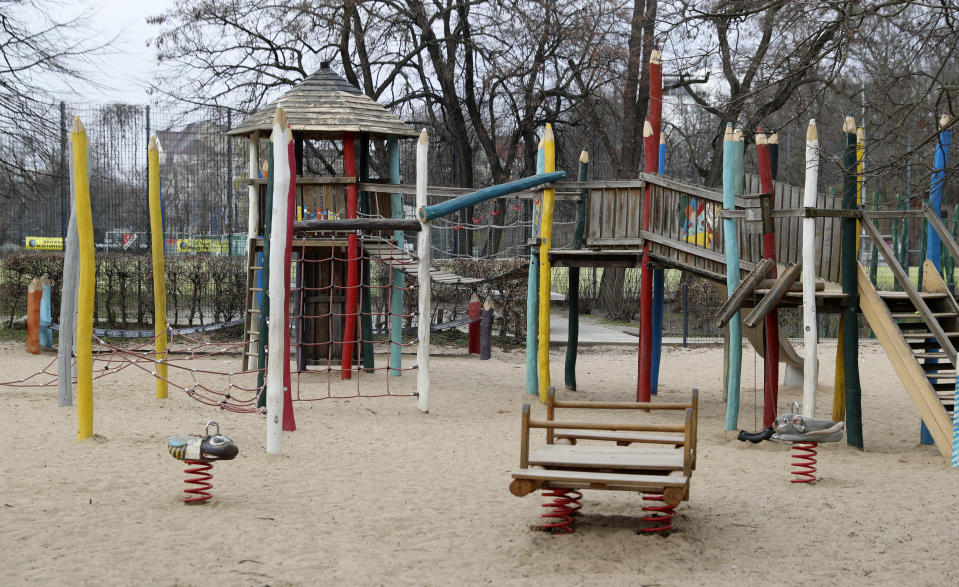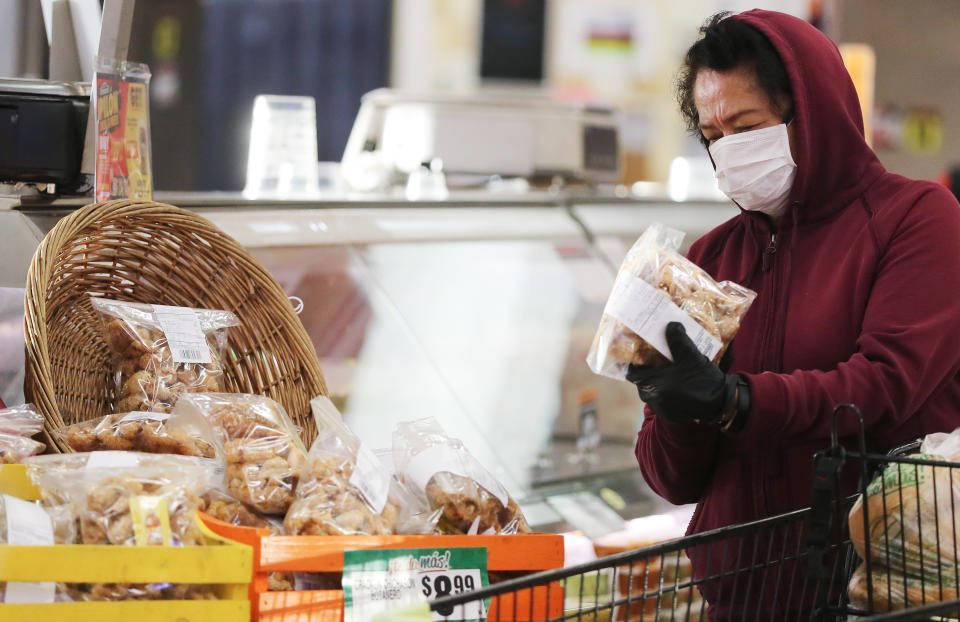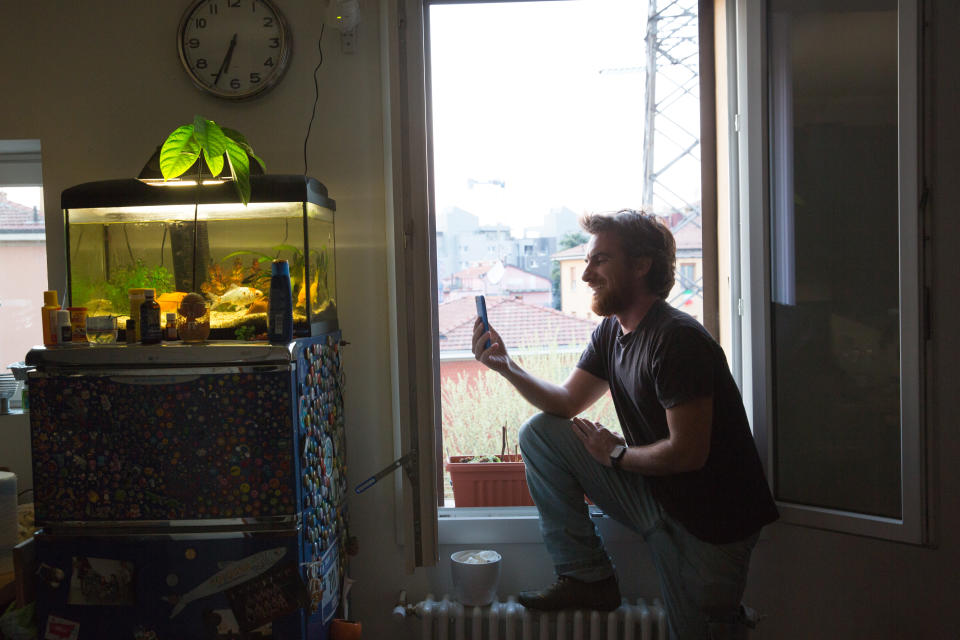Coronavirus Q&A with Dr. Kavita Patel
Dr. Kavita Patel, a nonresident fellow at the Brookings Institution, participated in a Thursday question-and-answer session about the coronavirus, discussing many of the pressing issues facing families around the world.
Patel, speaking at a virtual event for Verizon Media employees, gave her advice about the best ways to keep families safe, how to maintain mental health under quarantine and what everyone can do to help address the crisis, among other topics.
A transcript of her conversation, edited for brevity and clarity, is below.
Alex Wallace, head of media and content at Verizon Media: Could you start with the latest news that we have on how this virus spreads, symptoms and best ways to prevent it from spreading?
Dr. Kavita Patel: You hear a lot of people saying, “Quarantine for 14 days,” and that’s because the majority of people who have had this illness had an incubation period for, we believe, about 14 days. But the truth is the science is telling us that the range in that incubation period is from five days all the way to 37 days. So being quarantined for 14 days is good for probably 95 percent of people, but there’s still people who could get sick after those 14 days if they had come into close contact with someone with coronavirus.
You’ll hear the most common symptoms are “lower respiratory.” Lower respiratory is usually a dry cough, or not too much of a mucusy cough, and then this feeling of, “Gosh, it’s harder to breathe,” or “I feel like something’s wrong in my chest.”
None of these things are 100 percent true, but that’s the majority.
And then people have reported fevers. In adults, we generally will say you’ve got a fever if you’re over about 100.4 degrees. But do not automatically check your temperature, see 100.4 degrees and worry. It’s just something that will get classified for many people as a low-grade fever.
If you don’t take precautions, this is an incredibly contagious virus. It’s novel because we know that it is also smart and it changes its own genomic pattern. And here’s really the kicker: We don’t have a known treatment today. I hope that will change in a short amount of time. But we have no known treatment and no vaccine for it.

I have a two-part question. One, who should go get tested? Two, should we all assume we have it and act to protect and build our immunities because testing is not right for everyone?
No. 1, who should go to the doctor? We know that there are certain geographic areas. The obvious ones are the ones people talk about: Iran, Italy, South Korea, China.
If you have been in known contact with somebody with coronavirus, we have more testing available. And it is worth at least a phone call to a health care professional, saying, “I came into contact with somebody. I do not have any symptoms, but I wonder if I can get tested?” And the majority of times today, you will hear somebody say, “Yes, Alex, there is a drive-through testing facility. We’re making appointments for you. And you should get tested.”
Even if you’re just wondering, “I’ve got a fever. I do have a runny nose. Should I get tested?” I still encourage people to reach out to a health professional. If I were to be on the other end of that phone call, I would tell you to come in if I know that you are pregnant, immunocompromised or someone who has a job where you have to be around a lot of other people.
You should not try to go to an emergency room. You should not try to show up in person to a clinic. Because either you can unintentionally get sick from people who are there, or you could unintentionally get others sick because of these crowded spaces.
Could you talk to us about how to keep your immune system healthy, and what are other things you’re advising people to do to keep healthy in their day-to-day lives?
The best immunity booster is a good night’s rest. I know that’s the kind of thing your mom tells you, but it turns out our moms are always right. (Don’t tell my mom that!)
Even myself, I’m really anxious about all this. I’m scared, like, “Can my kids ever go to a playground? Can I ever see my parents and hug them?” So I think that acknowledging that anxiety is important. But know that a way to boost your immunity is physically staying active and getting a good night’s rest. It is actually going to help you in the long run, both immunity-wise and mental-health-wise.

Can the virus live on surfaces? There’s some new data out about how long it can live on plastic, cardboard. How should packaging be handled?
Here’s what we can safely say. On plastic and metal surfaces — say, playgrounds and plastic bottles like I drink out of — the virus can live a median half-life, on average, of five to six hours.
They have found evidence of virus on those same surfaces — plastic and metal — for up to 72 hours. You can have a little bit of virus hanging around even after 72 hours, depending on how much virus you started with.
Cardboard boxes are a different story. Even with the most intense inoculation, the longest they saw it sticking around was 24 hours. But a majority of the viruses dropped off after about three to six hours.
If you’re incredibly concerned, keep that cardboard box as is for about 24 hours, and then handle it.
I’ve got kids that are going crazy and want to go to a playground. You don’t know when the last kid was on that surface. I would encourage a six-hour window.
Do you recommend that people wear face masks? There’s been a lot of information, misinformation. Your guidance there, please.
There are populations who would benefit from a face mask, and those are the very people who are highly likely to have a bad outcome from this disease: older people, people with other chronic conditions.
I will take myself: If you’re in your 40s and you’re healthy, I would not wear a mask just going to the grocery store.
I bet people forget how much they touch when they go to the grocery store. It’d be very important to be sure to wash hands as much as possible. This I would recommend: Think about wearing gloves. I would actually think about statistics of how this lives on surfaces. So that’s what I would do, and it’s what I’m practicing personally.

This is obviously an anxious and stressful time for everyone. What are you telling people they can do to boost their mental health?
Try to be conscious not just of your work colleagues, but think about people you haven’t touched base with for a long time, and how one action on your part can actually improve the mental health of someone else.
One in five people have depression. And imagine being depressed at a baseline, and then being told that you can’t even do what you normally do. But you’re already starting from a depleted gas tank. You might be one of those people, by the way, who is suffering from that, and you have to find ways to combat it. And you might be one of the four people who isn’t, but you can help that person.
It sounds very Pollyanna, but I find that — and I’ll speak as an American — I find that in times of crisis we see the best in people. And I’m hoping that this part of our mental health is something that we will say, “This was unprecedented in our world. But we saw the best of people.”
The “new normal.” How long do you think we will be in that phase?
Alex, a lot of us have been talking about school being canceled for a couple of weeks. Here’s what I think you have to accept as the “new normal”: This will go beyond two weeks. I do believe this social isolation period — teleworking, working from home — will go beyond this two-week period.
Kansas closed schools until the end of the year. Many universities moved to tele-learning till the end of the year. That, I think, will be widespread.
Close to mid-April or later in April, I do believe that we have some hope that we’ll have enough knowledge about whether we have to continue with this level of social distancing or whether we’ll be able to limit group sizes. But the nature of viruses is to have kind of a resurgence — and that can happen for many reasons, including that the virus itself changes.
Part of that new normal might be that we think very differently about travel, concerts, plays, churches and gatherings of large people.

You have kids. I have kids. How are you talking to your kids about this and balancing wanting to be honest and transparent, and also being parental and calm?
I consulted my smartest friends who are child psychologists and psychiatrists. All of them have said the same thing: Do not try to hide the truth. You should talk very honestly about viruses, showing children what they should be doing to protect themselves when they sneeze or when they’re washing their hands.
Try not to use the words “death” and “panic” with younger age groups. Just say, “When people have this, they can get very sick. It’s something we can avoid by doing these things.”
Try to give them some semblance of structure. Put into that routine time for you to spend with them, which we normally just don’t do because of our busy lives.
If you have older children or young adults, try to actually be proactive and say, “I’m a little scared too, but I know by doing this, I know we’re going to help take care of ourselves. And I want you to come to me if you see something that you’re scared about.”
And here’s the real critical piece. I take care of young adults; they tend not to be the ones who pick up the phone and want to call their doctor. I would strongly say, “Look, if you’re feeling sick, or if you want to talk to somebody, I will do it for you. But tell me what’s going on.”
What can we do ourselves to help medical professionals, and also how can we have our users help medical professionals right now?
Stay home. I know it’s hard. I’m feeling it every day. Stay home. That’s No. 1.
No. 2, the front lines are really the emergency rooms. They’re incredibly busy, so try to do everything you can to avoid using the ER as the point of triage. It’s better for you to call someone like me than to show up in an emergency room.
No. 3, I would encourage people to think about how we can support health care workers in a number of ways. It might be to volunteer to take care of a health professional’s kids. Here’s my little plug: The majority of health care workers are low-wage. I’m blessed; I’m going to have resources to try and pay somebody. But a lot of people I work with have no extra resources.
I would say for your audience to think about creative ways that we can support the health care system beyond the more obvious ones — along with staying home.
_____
Read more from Yahoo News:


